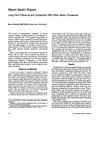Prospective Metabolic Evaluation of 150 Consecutive Patients Who Underwent Gastric Exclusion
April 1984
in “
The American Journal of Surgery
”

TLDR Gastric exclusion surgery caused major weight loss and health improvements but led to some anemia and vitamin deficiencies.
In a 1984 study, 150 patients who underwent gastric exclusion surgery were followed for an average of 27.8 months, with some up to 6 years. The patients, predominantly women, experienced significant weight loss, averaging 75% of excess weight, and maintained this loss for 2 to 5 years. The surgery led to improvements in metabolic parameters, including protein metabolism, liver function, and lipid profiles. All diabetic patients were able to discontinue therapy, and improvements were seen in blood pressure, with 96% of hypertensive patients becoming normotensive. Mild electrolyte disturbances were noted, but no severe cases. The surgery also resulted in the elimination of diabetes, gout, and hyperlipidemia in the majority of patients, and improved hepatic function. However, long-term follow-up indicated anemia and vitamin deficiencies in some patients, suggesting the need for indefinite monitoring. Overall, the surgery was associated with significant and sustained improvements in weight and various health parameters, with the potential to reduce future morbidity and mortality.
